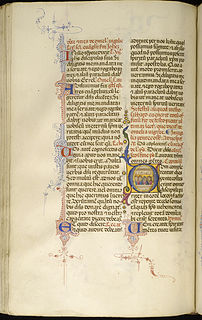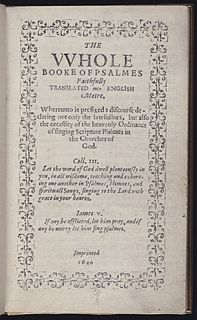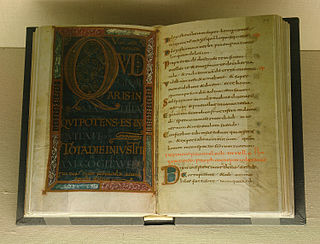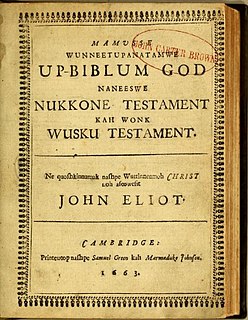
The Roman Breviary is the liturgical book of the Latin liturgical rites of the Catholic Church containing the public or canonical prayers, hymns, the Psalms, readings, and notations for everyday use, especially by bishops, priests, and deacons in the Divine Office.

The King James Version (KJV), also known as the King James Bible (KJB) or simply the Authorized Version (AV), is an English translation of the Christian Bible for the Church of England, begun in 1604 and completed as well as published in 1611 under the sponsorship of James VI and I. The books of the King James Version include the 39 books of the Old Testament, an intertestamental section containing 14 books of the Apocrypha, and the 27 books of the New Testament. The translation is noted for its "majesty of style", and has been described as one of the most important books in English culture and a driving force in the shaping of the English-speaking world.

The Book of Psalms, commonly referred to simply as Psalms or "the Psalms", is the first book of the Ketuvim ("Writings"), the third section of the Hebrew Bible, and thus a book of the Christian Old Testament. The title is derived from the Greek translation, ψαλμοί, psalmoi, meaning "instrumental music" and, by extension, "the words accompanying the music". The book is an anthology of individual psalms, with 150 in the Jewish and Western Christian tradition and more in the Eastern Christian churches. Many are linked to the name of David, but his authorship is not accepted by modern scholars.

The Vulgate is a late-4th-century Latin translation of the Bible that became the Catholic Church's officially promulgated Latin version of the Bible during the 16th century. The translation was largely the work of Jerome, who in 382 had been commissioned by Pope Damasus I to revise the Vetus Latina Gospels then in use by the Roman Church. Jerome, on his own initiative, extended this work of revision and translation to include most of the books of the Bible, and once published, the new version was widely adopted and eventually eclipsed the Vetus Latina; so that by the 13th century, it had taken over from the former version the appellation of versio vulgata or vulgata for short, and in Greek as βουλγάτα ("Voulgata").

Phonics is a method for teaching reading and writing of the English language by developing learners' phonemic awareness—the ability to hear, identify, and manipulate phonemes—in order to teach the correspondence between these sounds and the spelling patterns (graphemes) that represent them.

Song of Ascents is a title given to fifteen of the Psalms, 120–134, each starting with the superscription Shir Hama'aloth. They are also variously called Gradual Psalms, Songs of Degrees, Songs of Steps or Pilgrim Songs.

In the practice of Christianity, canonical hours mark the divisions of the day in terms of periods of fixed prayer at regular intervals. A book of hours normally contains a version of, or selection from, such prayers.

The Bay Psalm Book was the first book printed in British North America. The book is a metrical Psalter, first printed in 1640 in Cambridge, Massachusetts. The Psalms in it are metrical translations into English. The translations are not particularly polished, and not one has remained in use, although some of the tunes to which they were sung have survived. However, its production, just 20 years after the Pilgrims' arrival at Plymouth, Massachusetts, represents a considerable achievement. It went through several editions and remained in use for well over a century. One of eleven known surviving copies of the first edition sold at auction in November 2013 for $14.2 million, a record for a printed book.

A psalter is a volume containing the Book of Psalms, often with other devotional material bound in as well, such as a liturgical calendar and litany of the Saints. Until the later medieval emergence of the book of hours, psalters were the books most widely owned by wealthy lay persons and were commonly used for learning to read. Many Psalters were richly illuminated and they include some of the most spectacular surviving examples of medieval book art.

The Old English Bible translations are the partial translations of the Bible prepared in medieval England into the Old English language. The translations are from Latin texts, not the original languages.

The New American Bible (NAB) is an English translation of the Bible first published in 1970. The 1986 Revised NAB is the basis of the revised Lectionary, and it is the only translation approved for use at Mass in the Roman Catholic dioceses of the United States and the Philippines, and the 1970 first edition is also an approved Bible translation by the Episcopal Church in the United States.

A metrical psalter is a kind of Bible translation: a book containing a metrical translation of all or part of the Book of Psalms in vernacular poetry, meant to be sung as hymns in a church. Some metrical psalters include melodies or even harmonizations. The composition of metrical psalters was a large enterprise of the Protestant Reformation, especially in its Calvinist manifestation.
Matins is a canonical hour of Christian liturgy.

The Liturgy of the Hours or Divine Office or Work of God or canonical hours, often referred to as the Breviary, is the official set of prayers "marking the hours of each day and sanctifying the day with prayer". It consists primarily of psalms supplemented by hymns, readings and other prayers and antiphons. Together with the Mass, it constitutes the official public prayer life of the Church. The Liturgy of the Hours also forms the basis of prayer within Christian monasticism.

The New England Primer was the first reading primer designed for the American Colonies. It became the most successful educational textbook published in 17th century colonial United States and it became the foundation of most schooling before the 1790s.

The Latin Psalters are the translations of the Book of Psalms into the Latin language. They are the premier liturgical resource used in the Liturgy of the Hours of the Latin Rites of the Roman Catholic Church. These translations are typically placed in a separate volume or a section of the breviary called the psalter, in which the psalms are arranged to be prayed at the canonical hours of the day. In the Middle Ages, psalters were often lavish illuminated manuscripts, and in the Romanesque and early Gothic period were the type of book most often chosen to be richly illuminated.
Rhymed psalters are translations of the Psalms from Hebrew or Latin into poetry in some other language. Rhymed psalters include metrical psalters designed for singing, but are not limited to that use.
Reformed worship is religious devotion to God as conducted by Reformed or Calvinistic Christians, including Presbyterians. Despite considerable local and national variation, public worship in most Reformed and Presbyterian churches is governed by the Regulative principle of worship.

The Eliot Indian Bible was the first Bible published in British North America. English Puritan missionary John Eliot produced a translation of the Geneva Bible into the indigenous Massachusett language. This is the reason that it is also known as Eliot's Indian Bible.Mamusse Wunneetupanatamwe Up Biblum God and the cover page of the translated Bible means The Whole Holy His-Bible God, both Old Testament and also New Testament. This turned by the-servant-of-Christ, who is called John Eliot.
















